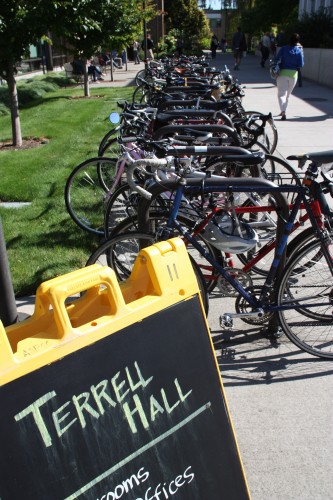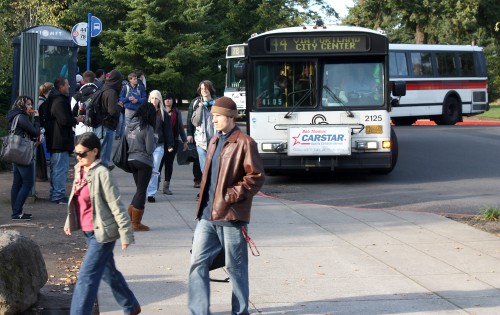This content was published: November 3, 2011. Phone numbers, email addresses, and other information may have changed.
As it grows, PCC promotes alternative transportation
Photos and story by James Hill
It’s a familiar story at Portland Community College.
Thanks to skyrocketing student enrollment (42 percent increase in credit students the last five years), people circle lots looking for a prized parking spot. Part of it is because 80 percent of faculty, 74 percent of staff and 67 percent of the college’s students drive alone.

Students and staff at Cascade Campus love to ride their bikes to campus as evident by the use of the plentiful bike racks. Ten percent of travelers to the campus use bikes.
“Sixty-percent of the carbon emissions on campuses is from car traffic,” said Wing-Kit Chung, Vice President of Administrative Services. “The more we understand staff, students and faculty the better we understand their needs.”
Alternatives to driving alone
PCC’s Parking and Transportation Services has done just that in coming up with many strategies to combat solo driving and alleviate pressures on parking. One of them is the Ride Share Program, which encourages students who would normally drive separately to ride to campus together. If they do, they can go to the business office with each of their vehicles information, and each student will be billed $20 for the shared use of one permit. In addition to the savings in gas, the participating students can save $10 on the price of buying the regular student permit.
In addition, PCC partnered with METRO, the state of Oregon and the state of Washington to offer a new transportation matching system called Drive Less Connect that lets you find other PCC travelers with similar routes and times.
As always, the college offers to any student, enrolled for three or more credit hours, a Student Select Pass, which is an all-zone pass good for travel on Tri-Met. For faculty and staff, PCC allows them to purchase a monthly Tri-Met bus pass on a pre-tax basis. For the average employee this would reduce the cost of the pass by approximately 22 percent. If you qualify for either of these passes, visit the FAQ page.
That’s not all. Not only has PCC increased shuttle capacity with larger buses on key routes but catching the shuttles has become much easier. Students, staff and faculty can view live GPS data about PCC Shuttle locations, follow the shuttle on Twitter to get updates, or download the app on their phone to get live tracking right on their mobile devise.
In addition, PCC is always bike friendly. The college has plenty of bike racks on all campuses as well as racks available on all shuttles on a first come first served basis. The college is looking at developing more bike racks and shower stalls for riders to accommodate the demand.
Why not build more parking spaces?
The college has established the Transportation Demand Management group, led by Chung and various students, staff and faculty, to brainstorm and promote innovations of how people travel to PCC campuses. It won’t be easy to solve parking issues. The college is restricted by city and county regulations limiting the number of parking spaces it can have on any campus. And, if you do build more spaces and have ample parking, it can encourage more driving, which conflicts with the college’s Climate Action Plan, said Chung.
Chung also said that parking spaces are expensive to build and maintain, costing upwards of $30,000 per space.

The college offers to any student, enrolled for three or more credit hours, a Student Select Pass, which is an all-zone pass good for travel on Tri-Met. For faculty and staff, PCC allows them to purchase a monthly Tri-Met bus pass on a pre-tax basis.
“We are also limited by the amount of traffic we can have on campus in any one day,” said John Garner, manager of Parking and Transportation Services. “At Sylvania, that is 17,000 cars a day and we are at that limit now.”
The TDM group that Chung and Garner lead aims to provide options that reduce car traffic and parking demand, and reduce carbon emissions and implement strategies to result in greater sustainability. Plus, they want to improve these numbers:
Percentage of PCC commuters that are bike riders
- Cascade – 10 %.
- Southeast Center – 6 %.
- Rock Creek and Sylvania campuses – 1 %.
Percentage that are Carpoolers
- Rock Creek – 8 %.
- Sylvania – 6 %.
Percentage that are bus riders
- Southeast Center – 16 %.
- Cascade – 13 %.
- Rock Creek – 12 %.
- Sylvania is 10 %.
“We are committed to providing a balance of options the college community can access,” Chung added.
For alternative transportation ideas like the PCC Shuttle or bicycling, visit the PCC Parking and Transportation webpage.


[…] the college invests in ecology through transportation demand management as well as other areas, I have a question for you. How are you contributing? Cascade students, if […]